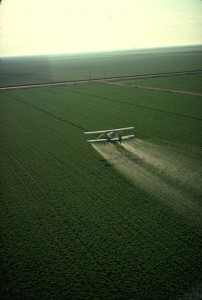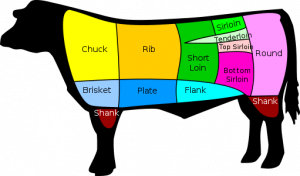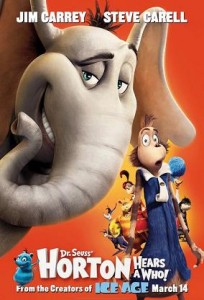Horton Hears a Who!, by Dr. Seuss is a beloved children’s book that was recently developed into a major film. Anti-abortion people commandeered this book as a sort of anti-abortion manifesto and used the movie to stage protests. After all, how could you misinterpret the line, “a person’s a person, no matter how small”? Well, none of the characters in the book are technically “people,” so the logic kind of gets skewed. Instead, I would like to offer up an interpretation of this book as an anti-vegan manifesto and re-interpret the main line as “an animal’s an animal, no matter how small.”
Confused?
Allow me to elaborate. Although being small in size, the Whos of this children’s book are strongly affected by the larger world they are a part of. In my interpretation of the book, the Whos represent insects. Very few people think of insects as animals, but they surely are, despite their tiny size. They are complex organisms with a nervous system that just might be capable of feeling pain, yet they are all-too-often forgotten about in any sort of debate between vegans and carnivores.[1]

Of course, I’m not simply talking about the swatting of a fly, but the destruction of countless insects via the use of pesticides. A study from 2007 showed over 400 million acres of cropland in the USA.[2] There are an estimated 40 million insects per acre of land.[3] Even if only half of this cropland employs pesticides that are only 50% effective, the number of insects killed is still painfully high. This doesn’t even take into consideration the number of insects that are simply sterilized by insecticides. Sterilizing an insect sounds like torture to me and I venture to say it is more torturous than searing beaks off of chickens. Remember, just because our range of vision allows us to see the chickens more clearly doesn’t mean they are in more pain.
The amount of insects killed by pesticides is a tragedy in itself, but these insects aren’t the only poor creatures affected. Use of DDT did considerable damage to the ecosystem and even contributed to the endangerment of the California condor (which is one of the animals that vegans probably actually care about). Although it’s now banned in the US, DDT is still in use in developing countries like China. Even without DDT, our current pesticides aren’t exactly healthy.[4] In 2004, tests found that current pesticides called chlorpyrifos and methyl parathion have been found in average people at levels 4.6 times more than what is acceptable.[5] I can only imagine how much worse the count must be for animals eating the same vegetables. This is just another hidden danger in eating vegetables.
Sometimes people who aren’t even eating the vegetables have to suffer. In 1984, a pesticide plant in Bhopal, India killed an estimated 18,000-27,000 people.[6] It was a major tragedy that wouldn’t have happened if not for the use of pesticides.
But back to the insects.
I know insects aren’t as cute as chickens or cows, but that doesn’t make them any less conscious. Some ants are so smart that they have developed the ability to farm aphids. Yet, somehow vegans find it necessary to protect animal species like cows and chickens that wouldn’t even exist if they hadn’t been domesticated by humans thousands of years ago.

As a staunch unvegan, I recognize the need for animal products in the world. I don’t really wear animal products and would love if all animals were free range, but I also know that for me to eat, animals must die. Whether it is the tiniest aphid or the biggest cow, animals cannot escape human hunger. Fortunately for the insect world and my own conscious, I have chosen to eat meat rather than vegetables. According to GotAngus.com, a typical cow will provide 400 to 600 pounds of meat. This translates into around 300 meals. Even a single chicken provides enough food for at least four meals. It’s amazing how few animals really have to be killed to sustain an unvegan.
Sadly, many people have chosen a different path. This path leaves a wake of animal destruction behind and is called eating vegetables. A single vegetable can hardly sustain an entire meal, yet dozens of insects sacrificed their lives just so it could grace the plate of a vegetable-eater before being devoured. And it doesn’t even taste good.
Now I fully expect vegans to have a retort. They’ll say that there are so many insects in the world (in fact they comprise an estimated 80% of the animal world), who cares if a small percentage is killed by pesticides? They’ll probably say they don’t support pesticides, while forgetting the other countless numbers of insects killed during harvest. Honestly, I don’t really care about insects at all. But if it’s okay to kill so many insects, what is wrong with hunting deer when it doesn’t affect their population? Or the slaughter of cows and other domesticated animals that will be bred to maintain their populations?
It all boils down to one main point. For you to eat, an animal has to die. It’s up to you to decide whether you eat the animal directly or just try to forget about the hundreds of little animals that indirectly gave up their lives for your meal. And remember, even though you can’t see or hear them at all, an animal’s an animal, no matter how small.
1: http://www.cell.com/retrieve/pii/S0092867403002721
2: http://www.ers.usda.gov/StateFacts/US.htm
3: http://courses.washington.edu/insects/454Students/Resources/quotes.htm
4: http://www.chem.unep.ch/ddt/DDTProfiles/China.html
